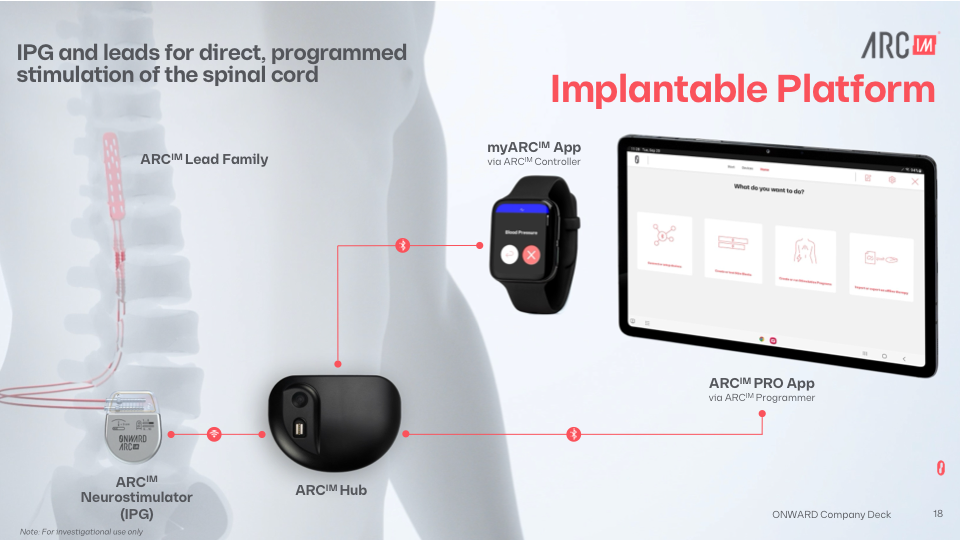People with Parkinson’s disease are being diagnosed earlier and living with the condition for longer periods as treatments evolve, but one stubborn late-arriving symptom is trouble walking. A promising new spinal implant from Swiss researchers offers some hope that this too can be treated effectively.
The multi-institutional team is led by Onward, a spinout company from the prestigious Ecole Polytechnique Federale de Lausanne in Switzerland, which since 2015 has raised $170 million to develop and commercialize medical devices for people living with brain and spinal cord injury.
The issue presented to the researchers, and of course to patients themselves, is the waning efficacy of chemical and deep-brain stimulus treatment as the condition begins to affect gait. While extra dopamine and brain stimulation can help minimize tremors and other symptoms, walking can still deteriorate.
Jocelyne Bloch and Grégoire Courtine, founders of the NeuroRestore research team at EPFL focusing on this topic, felt that perhaps the neural signals leading to successful locomotion could be improved downstream, in the spinal cord, rather than at relevant loci in the motor cortex or cerebellum. They were clearly emboldened by the success of a spinal implant intended for people with paralyzing injury; this new paper is an extension of the same principle and hardware.
To set expectations, it should be made clear that this patient, Marc, is the only human to try this, though it is by his and other accounts highly effective. These preliminary results will be followed by testing in six more individuals, with a grant from the Michael J. Fox Foundation.
As you might expect, the implant — called ARC-IM — isn’t exactly simple to install and it requires considerable work to get it working.
The patient first gets a lacework of electrodes around the part of the spine that sends signals to their leg muscles. It’s here that, though it’s an over-simplification, the “walk” signal gets turned into the complex rhythm of muscular movements that most tend to take for granted.

Then a control unit is attached that has movement models trained on actual motion capture footage of the person walking, if they can. These are triggered by cortical activity that has also been monitored and characterized in the patient, so the unit can activate the muscular groups in synchrony with intent, not just operating the legs like machines.
Basically, by observing the patient try to walk and comparing that to an unimpaired gait and neural signals, the implant can bridge the gap between them, completing the circuit between intent, action and feedback.
As is visible in before-and-after videos of Marc getting around, the difference is night and day. Where he once had trouble walking at all, and especially in certain situations like entering an elevator or climbing stairs, now he moves with no obvious impairment at all.
“Getting into an elevator… sounds simple. For me, before, it was impossible. I was skating, I was freezing,” Marc said (translated from French) in a video from NeuroRestore showing the efficacy of the device. “Now I’m going in quietly. I have no problem. It lets me walk better, lets me do five kilometers without stopping.”
If you didn’t know he was living with advanced Parkinson’s disease, you certainly would not guess it from how he walked around his picturesque hometown near Bordeaux. At most you might think he’d had a long day of skiing.
With a single patient on the record, it’s going to be a while before anyone with a similar condition will be able to walk into their doctor’s office and say “give me that implant.” But the transformative effect of the tech on Marc was clearly too strong a signal to not crow about a bit. The team’s paper appears in the journal Nature Medicine.
The million dollars from the Michael J. Fox Foundation will put implants in the next six patients and allow for a more rigorous evaluation of the risks — and any treatment this invasive is going to have some. The spinal surgery looks quite tricky even for surgeries of that type, and then there are the usual running problems of having a transdermal interface.
As for commercialization of the technology (for that is the way such things tend to reach the most people), Onward is empowered with all the money and patents to make it happen, and the exclusive right to do so. Before the full implant becomes available (which might take years), the company intends to offer an external spinal stimulation platform called ARC-EX.































Comment